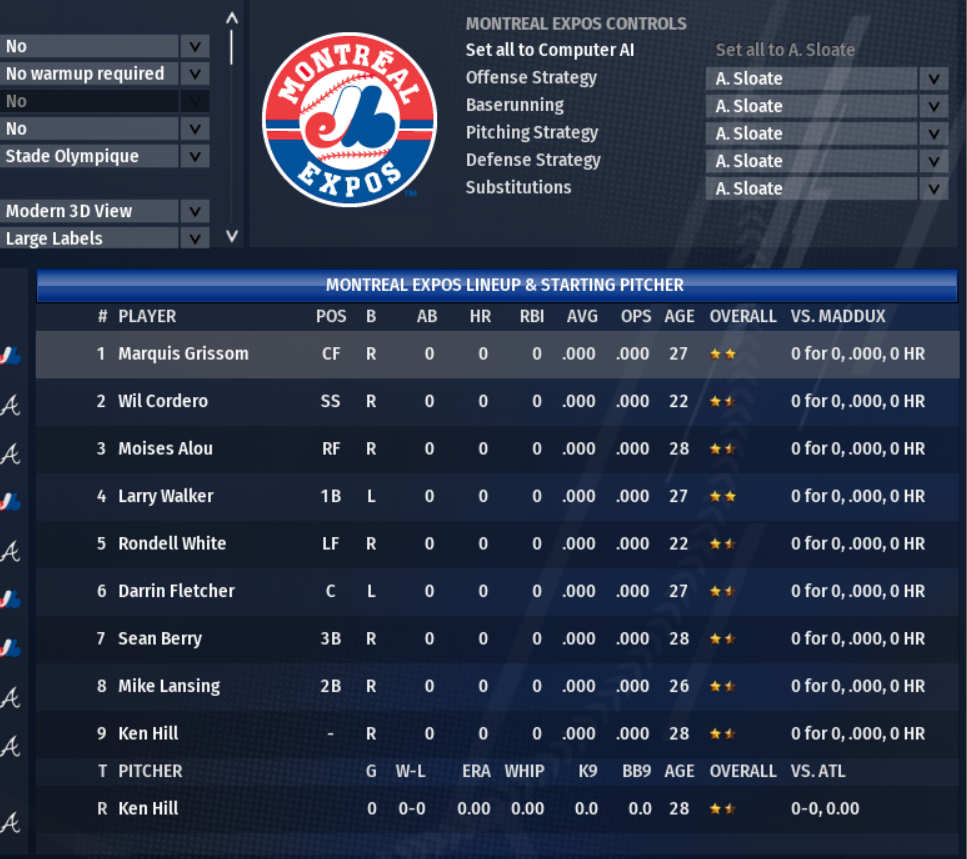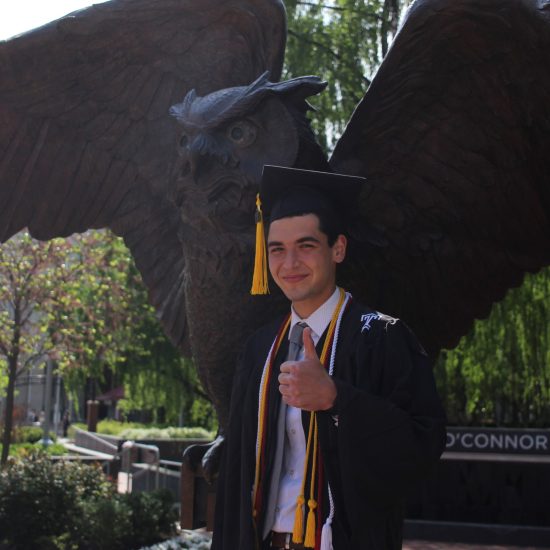On August 11, 1994, the MLB season ended with a strike. No postseason was played. No World Series champion was crowned.
At the time of the strike, the standings looked as follows:

Standings as of August 11, 1994.
Some highlights from the standings: the Texas Rangers led the AL West with a 52-62 record. The Dodgers, just barely over .500, led the NL West with a 58-56 record. The Yankees led the AL East and the overall AL with a 70-43 record. But most importantly, the Montreal Expos led the NL East with a 74-40 record. Even adjusting for their Pythagorean Win/Loss, the Expos still held the best record in Major League Baseball.
The Expos held a 6-game lead over the Braves, with 48 games left in a hypothetical extension to the season. This is especially significant because the Expos held the game’s second-lowest payroll. Their entire team cost a grand total of $19,098,000, which was less than half of the Braves or the Yankees, who each spent just over $46 million on their teams for the season. The $19.1 million in 1994 money is equivalent to roughly $33.3 million in 2020 dollars, which is just over half of what the Orioles are paying their team in 2020 ($65 million). Yet they had 2 players who would be elected to the Hall of Fame, and 5 players who were named All-Stars during this 1994 season (tied for the most in MLB that season). The payroll disparity can be attributed in part to the age of Expos players (average age: 26.2 years old), and lack of MLB experience from some of their best players.
For example-
Moises Alou was worth 5.1 bWAR that season, yet was paid $1.4 million.
Will Cordero was worth 3.1 bWAR that season and made the All-Star team, yet was paid $200,000.
The team also employed HOFer Larry Walker, HOFer Pedro Martinez, shutdown closer Jon Wetteland, and many more. The bottom line is, this team was stacked.
So, what would have happened if MLB had finished the regular season? Would the Expos have won the World Series and potentially saved themselves from Washington, D.C.?
For this, we turn to the wonderful simulator known as Out of the Park Baseball. I took the teams eligible for the postseason on the day the season ended — August 11. That means the White Sox won the AL Central, despite holding only a half game lead over the Indians. The Indians grabbed the Wild Card spot.
The Division Series bracket was as follows:
White Sox (Home Field Adv.) vs. Rangers
Yankees (Home Field Adv.) vs. Indians
Expos (Home Field Adv.) vs. Braves
Reds (Sorry, Astros!) vs. Dodgers
The playoff series were played according to MLB rules. So the home team hosted 2 games, then the road team hosted 2, and then it went back to the home team’s park for a 5th game, if necessary. I set each team’s lineup and batting order to reflect the players who played in each team’s final game.
Here’s a snapshot of the team’s playoff lineup.

The only alteration made was the catcher matchup. Fletcher started against right-handers and Lenny Webster started against lefties. Webster actually started the final game of the season, but it made more sense to roll with Fletcher, who accumulated more WAR over the course of the season.
Ken Hill started Game 1 against 1994 Cy Young winner Greg Maddux.
*Note: Fletcher is not related to superutility God-King David Fletcher, nor his brother Dominic.
Simulation Results:
NLDS: Braves vs. Expos
Game 1: Braves 5, Expos 3.
Game 2: Expos 8, Braves 2. Pedro pitched an absolute gem in this one, going 7 IP, allowing 5 hits, 1 ER, and striking out 11.
Game 3: Braves 5, Expos 4. Solid outing from John Smoltz, who went 7 IP, allowed 3 hits, 3 ER, and struck out 10. Braves just 1 game away from the NLCS now.
Game 4: Braves 5, Expos 2. Unfortunately, the Expos would not have won the World Series, according to this simulation. The Braves used their lights-out pitching to advance to the NLCS.
NLDS: Dodgers vs. Reds
Game 1: Dodgers 3, Reds 1.
Game 2: Dodgers 2, Reds 0. Pitching reigns supreme after 2 games. Mike Piazza’s second HR of the series set the Dodgers up to move within 1 game of the NLCS.
Game 3: Reds 9, Dodgers 2. Rough outing from Orel Herschiser.
Game 4: Dodgers 5, Reds 4. The Dodgers move on to the NLCS after a relatively easy jaunt against the Reds.
ALDS: Indians vs. Yankees
Game 1: Yankees 6, Indians 2.
Game 2: Yankees 7, Indians 3. The Yankees do what no other team with home-field advantage has done- win both home games. They are just 1 win from the ALCS now.
Game 3: Indians 6, Yankees 3. The Indians answer back, thanks in part to Jim Thome’s second home run of the series.
Game 4: Yankees 9, Indians 1. Jim Thome homers again, but the rest of the team has no answer for the Yankees pitching. The Yanks advance to the ALCS.
ALDS: Rangers vs. White Sox
Game 1: Rangers 5, White Sox 4.
Game 2: Rangers 6, White Sox 5. The Rangers have done what the Dodgers did- they won both road games and took their lead back home, putting the ALCS within reach.
Game 3: White Sox 19, Rangers 3. Yikes.
Game 4: White Sox 10, Rangers 4. Neither team has won a game at home. Frank Thomas goes yard twice, tacking on his third and fourth home runs of the series. The only series to go 5 games now heads back to Chicago for a pivotal Game 5.
Game 5: Rangers 1, White Sox 0. Wow. A series ruled by home runs and scoring is concluded by a relative absence of both. The Rangers will face the Yankees in the ALCS.
1994 Hypothetical ALCS: Rangers vs. Yankees
Game 1: Yankees 13, Rangers 0. A rough outing from the Rangers. The Yankees used a big 7-run 5th inning to coast to victory.
Game 2: Rangers 3, Yankees 2. The Rangers returned from their beating to take Game 2 in New York.
Game 3: Rangers 7, Yankees 6. The Rangers were able to plate 2 runs in the bottom of the 9th inning to steal this one away from the Yankees and take a 2-1 lead in the series.
Game 4: Rangers 9, Yankees 7. The Rangers’ bats again carry them to the win. In addition, the Rangers again plated 2 runs in the bottom of the 9th inning to win and go up 3-1 in the series.
Game 5: Yankees 4, Rangers 3. The Yankees finally wake up after losing 3 consecutive games to take this series back to New York. The Yankees are 3-1 at home in the playoffs up to this point.
Game 6: Yankees 3, Rangers 2. In another tight contest, the Yankees are able to cling to their lead and even the series at 3 apiece. Yankee Stadium will host a Game 7.
Game 7: Yankees 4, Rangers 2. The Yankees may or may not have contacted someone important in the underworld, as they are able to ressurrect their season (from down 3-1) and advance to the World Series.
1994 Hypothetical NLCS: Dodgers vs. Braves
Game 1: Braves 13, Dodgers 5. Not a perfect outing from Maddux, but good enough. Atlanta’s bats woke up after lying relatively dormant against Montreal.
Game 2: Braves 6, Dodgers 2. Another strong outing from Braves pitching, which has been a theme of this postseason. The Braves have allowed more than 5 runs just once in 6 games.
Game 3: Dodgers 11, Braves 8. Well, looks like the Game 2 pitching didn’t carry over to game 3. Hershiser struggled again, but Smoltz struggled more. Braves now hold a 2-1 lead.
Game 4: Braves 6, Dodgers 5. The Braves rebounded to put themselves just 1 win away from the World Series with a 13-inning win. Steve “Bedrock” Bedrosian gets the W for the Braves in this one.
Game 5: Braves 2, Dodgers 1. The Braves cling on for dear life in the pivotal Game 5 and win the series 4-1. They are now just 4 wins away from claiming a World Series title.
After two rounds of simulation, we have an all-time classic matchup in the 1994 Hypothetical World Series, between the Yankees and the Braves. I’d like to take this opportunity to point out that the Expos did not make a significant splash in the postseason, despite their league-leading record at the end of the strike. The question is, since the Expos made the playoffs, do they follow down the same path as they did in 1994’s offseason in selling off some of their best players?
In real life, after the strike ended the season, the Expos missed out on 29 regular season games of revenue (home games) and potential playoff games. There was likely some significant revenue waiting for the Expos in the postseason if they were to reach it. Would it have been enough to make the Expos reconsider their ‘fire sale?’
Probably not. The Expos were among the lowest-attended teams in the league, even during their best season ever. They reached just over 1 million fans during the season, albeit with some home games missing from their schedule, due to the strike. Their local revenue, according to a report by the MLB Commissioner’s Blue Ribbon Panel, was the lowest in the league. They generated an average of only $12 million in revenue from 1995-1999, easily the lowest in the league and despite local revenues doubling during that time. The median revenue was over $50 million during this time, for context.
The Expos probably would’ve relinquished Larry Walker’s arbitration years–as they did in real life–and they likely would’ve traded John Wetteland, Marquis Grissom, and Ken Hill as they did during the offseason of 1994-1995. Nothing short of a deep playoff run would have enabled the Expos to raise the necessary capital to keep their budding ’superteam’ as it was. Even with a very successful regular season in 1994, the owner was still not willing to spend to keep the team’s best players in Montreal, so I sincerely doubt that a first round playoff exit would have changed his mind any more significantly. Of course, I don’t know the playoff revenue that would have been generated, so it could have been substantial enough to potentially pay Walker. But we will never know.
In my opinion, had the Expos been backed by a more generous owner and supported by a larger fanbase, we might have been able to witness some incredible history from 1995 onwards, with Pedro Martinez on the hill, Larry Walker over at first base, and John Wetteland closing games out with ease. Instead, we got to witness some of those players go on to Hall of Fame-level (or pretty high-level) greatness elsewhere. Larry Walker had a terrific career in Colorado, Pedro was Pedro, and Wetteland was a 3-time All Star and won a World Series with the Yankees just a few years later.
As far as the results of the 1994 Hypothetical World Series:
Game 1: Braves 5, Yankees 1.
Game 2: Yankees 7, Braves 1.
Game 3: Yankees 7, Braves 4.
Game 4: Braves 4, Yankees 3.
Game 5: Yankees 6, Braves 2.
Game 6: Yankees 9, Braves 7.
There you have it. The Yankees would go onto win the series, 4-2.
Photo by Tony Quinn/Icon Sportswire | Adapted by Michael Packard (@designsbypack on Twitter & IG)


So the big what-if would be this: Would the Yankees have made a managerial change after that led to Joe Torre being hired or since Showalter wins a World Title in 1994, do they keep him? If they keep him, does he lead the Yankees dynasty from 1996-2003 or do the Yankees even have a dynasty?